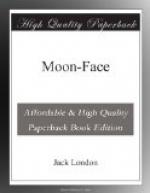This intense spirit of rivalry obtained in their studies and their games. If Paul memorized one canto of “Marmion,” Lloyd memorized two cantos, Paul came back with three, and Lloyd again with four, till each knew the whole poem by heart. I remember an incident that occurred at the swimming hole—an incident tragically significant of the life-struggle between them. The boys had a game of diving to the bottom of a ten-foot pool and holding on by submerged roots to see who could stay under the longest. Paul and Lloyd allowed themselves to be bantered into making the descent together. When I saw their faces, set and determined, disappear in the water as they sank swiftly down, I felt a foreboding of something dreadful. The moments sped, the ripples died away, the face of the pool grew placid and untroubled, and neither black nor golden head broke surface in quest of air. We above grew anxious. The longest record of the longest-winded boy had been exceeded, and still there was no sign. Air bubbles trickled slowly upward, showing that the breath had been expelled from their lungs, and after that the bubbles ceased to trickle upward. Each second became interminable, and, unable longer to endure the suspense, I plunged into the water.
I found them down at the bottom, clutching tight to the roots, their heads not a foot apart, their eyes wide open, each glaring fixedly at the other. They were suffering frightful torment, writhing and twisting in the pangs of voluntary suffocation; for neither would let go and acknowledge himself beaten. I tried to break Paul’s hold on the root, but he resisted me fiercely. Then I lost my breath and came to the surface, badly scared. I quickly explained the situation, and half a dozen of us went down and by main strength tore them loose. By the time we got them out, both were unconscious, and it was only after much barrel-rolling and rubbing and pounding that they finally came to their senses. They would have drowned there, had no one rescued them.
When Paul Tichlorne entered college, he let it be generally understood that he was going in for the social sciences. Lloyd Inwood, entering at the same time, elected to take the same course. But Paul had had it secretly in mind all the time to study the natural sciences, specializing on chemistry, and at the last moment he switched over. Though Lloyd had already arranged his year’s work and attended the first lectures, he at once followed Paul’s lead and went in for the natural sciences and especially for chemistry. Their rivalry soon became a noted thing throughout the university. Each was a spur to the other, and they went into chemistry deeper than did ever students before—so deep, in fact, that ere they took their sheepskins they could have stumped any chemistry or “cow college” professor in the institution, save “old” Moss, head of the department, and even him they puzzled and edified more than once. Lloyd’s discovery of the “death bacillus” of the sea toad, and his experiments on it with potassium cyanide, sent his name and that of his university ringing round the world; nor was Paul a whit behind when he succeeded in producing laboratory colloids exhibiting amoeba-like activities, and when he cast new light upon the processes of fertilization through his startling experiments with simple sodium chlorides and magnesium solutions on low forms of marine life.




